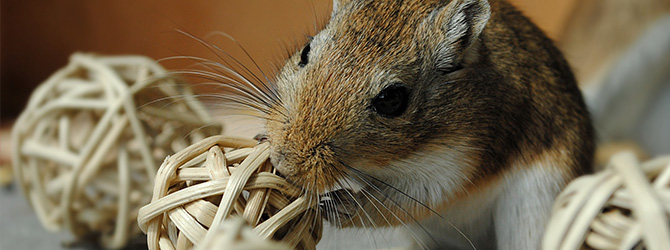Gerbil health problems & how to spot a healthy gerbil
Gerbils are relatively easy pets to look after, and can make a good introduction to animal care for younger members of the family. With the right care, most gerbils live for around four years.
As long as you keep your gerbils well fed and watered, and in a comfortable, suitable cage, they don’t demand a lot of attention. Gerbils are social animals so should be kept in pairs or small same sex groups.
Gerbils love to dig so provide a deep area of nesting material to allow them to perform this natural behaviour. Here are a few things to be aware of, to keep your small pet happy.
Signs of a healthy gerbil
It’s a good idea to get into the habit of checking your pet at least once daily so you can spot any problems early and get them treated by your vet – giving your gerbil the best possible chance of staying happy and healthy.
Your gerbil should have a shiny coat and fur covering on his tail. A happy gerbil will be active and playful – any listlessness, limping, matted fur or hairless patches on the tail could be a sign that you should get him to the vet.
His nose and mouth should be clean, and his teeth should be yellow – yes, you read that right! Your gerbil’s teeth and nails grow continuously, so it’s a good idea to provide wooden or cardboard toys that your pet can scratch and chew, to help keep them at a healthy length.
Any weight loss, or loss of appetite, can be signs that your pet is at best unhappy, and at worst unhealthy, so get him checked out by your local vet.
Finally, your gerbil’s bottom should be clean and dry. Keep a close eye out for any stickiness or mess, both of which can indicate diarrhoea or infection – and a sure sign that you need expert advice.
In summary… the signs of a healthy gerbil
- Active and playful
- Clean nose and mouth
- Good appetite
- Yellow teeth
- Clean and dry bottom
“Your gerbil’s teeth and nails grow continuously, so it’s a good idea to provide wooden or cardboard toys that your pet can scratch and chew, to help keep them at a healthy length.”
Gerbil health problems
It’s wise to keep a safe distance from your pet if you have the snuffles, as gerbils can catch colds from humans. If your gerbil shows any signs of a cold, such as a runny nose or sneezing, keep him warm and provide plenty of water. If the symptoms don’t clear within a couple of days, get him along to your local vet to rule out a more serious condition, such as pneumonia.
Gerbils can also contract a serious bacterial infection called Tyzzer’s disease. Symptoms include diarrhoea, loss of appetite and listlessness. Keep a close eye on your pet, and if you spot any of these signs and symptoms get him checked out by your vet.
While parasites are rare in small animals, it’s possible for your gerbil to contract fleas, lice, mites and ringworm from other animals in your home, such as dogs and cats. If you do suspect an infestation, disinfect his cage and equipment and speak to your vet for advice on treatment.
“Make sure you never hold your gerbil by its tail as they can easily get injuries to them.”
Diarrhoea in your gerbil may be a sign of too much wet food in their diet. It can also be a sign of infection, so keep a close eye on your pet, and pop him along to your vet if it hasn’t cleared up in a couple of days.
Gerbils have a scent gland on in the middle of their tummy which is completely normal but can sometimes develop problems so if you notice it being greasier than normal, larger or abnormal then take your Gerbil to the vets.
Gerbils can get diet related health problems so make sure to feed them a low fat diet, avoid sunflower seeds as these are very unhealthy for a Gerbil.
Need expert gerbil care and advice?
For more tips on how to care for your gerbil – or if you have any cause for concern about your pet’s health – contact your local vet.
Find your nearest vet using our Find a Vet page, or speak to a vet online using Online Vets.

